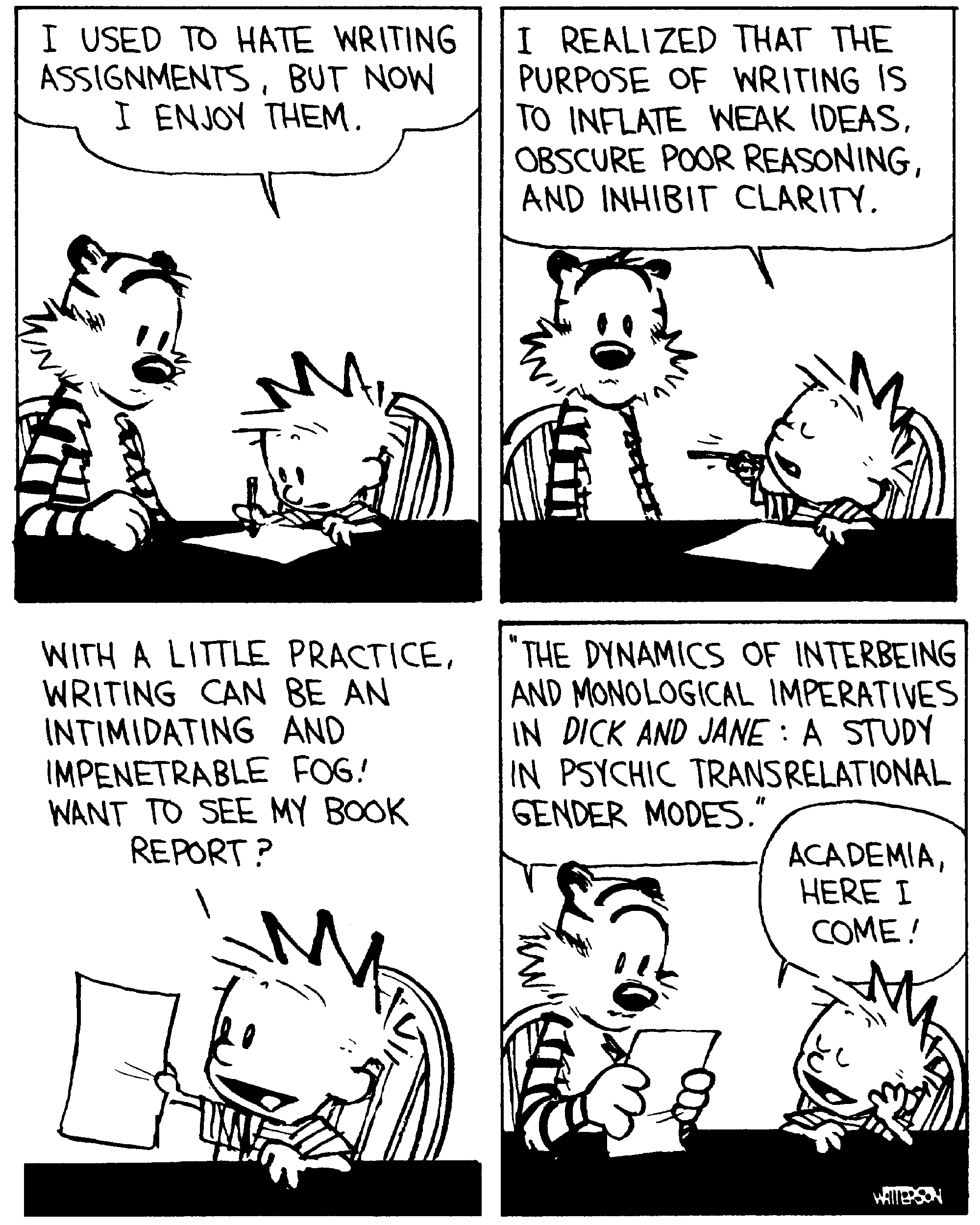
Source: Bill Watterson, Calvin and Hobbes: Homicidal Psycho Jungle Cat
In Why Academics Stink at Writing Steven Pinker, professor of psychology at Harvard University and chair of the usage panel of the American Heritage Dictionary points to Watterson’s Calvin to provide a summary for why academics stink at writing:
“…the purpose of writing is to inflate weak ideas, obscure poor reasoning, and inhibit clarity. With a little practice, writing can be an intimidating and impenetrable fog!”
In addition to this wonderful humour Pinker offers the following explanations for why so many academics write so poorly:
- Metadiscourse — Verbiage about verbiage or the unnecessary attempt to guide your read through your writing.
- Professional narcissism — The unnecessary description of their federation rather than what the audience wants to know.
- Apologizing — The over explanation of ideas that are difficult, complicated and controversial.
- Shudder quotes — Many academics have a nose-holding disdain for idiomatic English.
- Hedging — Academics often fear criticisms and cushion their prose with wads of fluff to give them a way out from making a firm commitment to an idea.
- Metaconcepts and nominalizations — Because academics spend so much time thinking about issues and ideas they write at that abstract level. This also contributes to their tendency use Zombie Nouns. They do this by turning a verb into a:
“lifeless noun by adding a suffix like –ance, –ment, or –ation. Instead of affirming an idea, you effect its affirmation; rather than postponing something, you implement a postponement.”
Pinker expands on all these ideas throughout his long article but his final reason for shoddy academic writing is:
“There are few incentives for writing well.”
Since few graduate programs teach writing, few academic journals stipulate clarity as a submission criteria and few reviewers and editor enforce it there is little professional motivation to engage in self improvement.
That is until now…
In this blog post The sophistication of truth Seth Godin argues that these common forms of complexity are the sophistication of fear.
“Long words when short ones will do. Fancy clothes to keep the riffraff out and to give us a costume to hide behind. Most of all, the sneer of, “you don’t understand” or, “you don’t know the people I know…”
“It’s complicated,” we say, even when it isn’t.
We invent these facades because they provide safety. Safety from the unknown, from being questioned, from being called out as a fraud. These facades lead to bad writing, lousy communication and a refuge from the things we fear.”
He encourages us to be fearless and reminds us that our work doesn’t have to be obtuse to be important or brave. I agree with Godin since I have spent that last 20+ years in academia I too have fallen into the traps of
“scientific sophistication, hoping to bamboozle [my] audiences with highfalutin gobbledygook.”
To be fearless Godin suggest that we need to start with:
“This is, “here it is, I made this, I know you can understand it, does it work for you?”
Perhaps the easiest way to do this is to stop writing in the conventional way and simply state what we need to state in the simplest terms. I subscribe to and read Godin’s posts on a daily basis because they are short, simple and to the point.
Or when it is appropriate we need to stop writing all together and use other forms of communication. The following video is a the best example of this sophistication in simplicity:
Do you prattle on with words when a video, infographic, illustation or other form of media is the right tool to use?






























